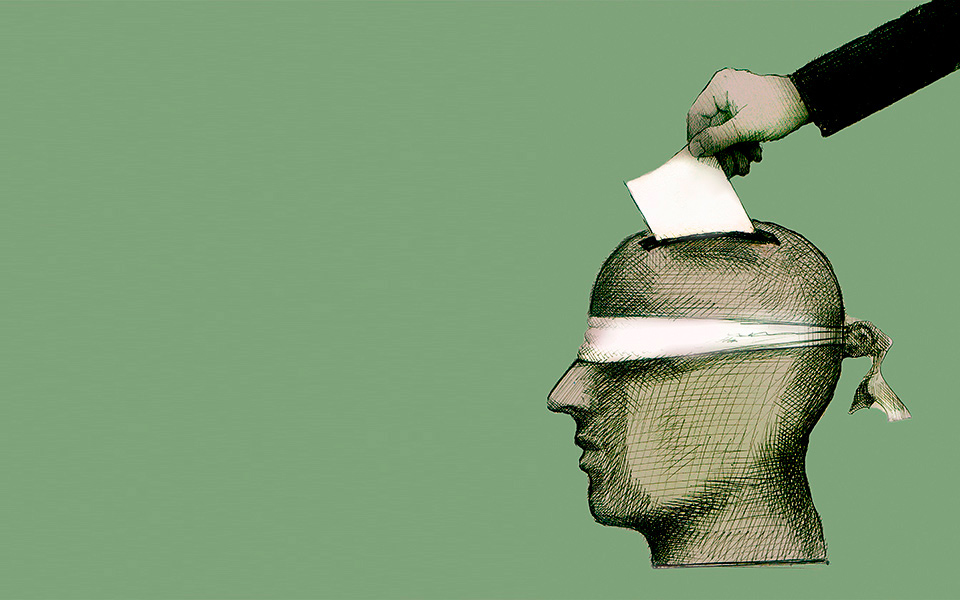Aptera, Crete: Where Ancient Echoes Still Resound
A once-mighty city-state overlooking Souda Bay,...

Representative democracies require a public (an electorate) that is adequately autonomous and sufficiently informed to be able to choose those who will make decisions on its behalf.
© Getty Images/Ideal Image
Political life in ancient Greece revolved around the polis, the city that constituted the community. There was no state in the modern sense and the territory was small. In Athens, decisions were taken partly by acclamation in an assembly of all citizens (male of course), partly by a council of 500 and partly by a number of magistrates elected by lot for a fixed term. As such, it was a horizontal, not a vertical, polity. This democratic city flourished and declined, but was ultimately unable to develop further because of the limited space in which it had been established. However, over the course of 2,000 years, this democracy “in miniature” evolved into the democratic state. In the meantime, the optimum regime, the political ideal, was res publica, literally the “public thing” which was very different from democracy. There is some nostalgia for the Athenian demos; a sense of lost of purity. Nevertheless, the current reality is better than we are willing to admit.
If the history of words and their meanings reflects the history of mankind, the controversy surrounding the word democracy in the 19th century testifies to the final collapse of ancient democracy. When the term re-emerged, it meant something new. Our modern democracies are, by default, liberal democracies; representative, not direct: they involve multiple mediations. These representative democracies require a public (an electorate) that is adequately autonomous and sufficiently informed to be able to choose those who will make decisions on its behalf. Conversely, when we talk about participatory democracy, we are referring to a system in which citizens decide for themselves; they do not delegate decisions to representatives. But is this possible? And if it is, to what extent?
“ A prerequisite for a shift from an electoral democracy to one in which the public decides on all issues, is a new public, equipped with experience and knowledge. When power is entrusted to political illiterates, when we decide on matters we know nothing about, the system becomes suicidal. ”
Participation means active and voluntary decision-making; if people are forced to take part, if they are mobilized through social unrest and propaganda, participation is meaningless. The proponents of participatory democracy believe that participation is a step forward, a step toward the real, the “authentic” democracy. They assert that participatory democracy must be converted to direct democracy through successive referendums. In the name of mass decision-making, representative democracy is bypassed and replaced by direct democracy – by a mirage of it.
In the late 1960s, the idea of participatory democracy was part of the zeitgeist and many such fads are still attractive today, especially in the ivory towers of academia. Not that the call for more participation is, by definition, unwelcome. However, if it becomes too inflated, if democracy is equated with inclusive participation, it may metamorphose into something that is not only unmanageable but also conceptually dangerous. In other words, excessive involvement in the public sphere means that citizens serve democracy, not the other way round. In their daily functioning, democracies are boring; and that’s how they should be. In most cases, the everyday grind denotes stability and social peace. Seen in this context, citizens should not waste their time constantly deliberating, voting and deliberating all over again; they should go about their business and live their lives as best they can in pursuit of happiness.

The proponents of participatory democracy believe that participation is a step forward, a step toward the real, the “authentic” democracy.
© Getty Images /Ideal Image
Some criticisms of democracy are legitimate. But the stigmatization that emanates from relentless perfectionism is unfair. The ingratitude of the modern-day citizen is often due to excessive expectations that democratic experiments cannot satisfy. However, the real threat to democracy is not an anti-ideal; it is the assertion that there can be a true democracy that rejects the existing one.
Thus, we are gravitating toward a democracy of referendums, in which citizens claim power without the mediation of representatives. But a prerequisite for a shift from an electoral democracy to one in which the public decides on all issues, is a new public, equipped with experience and knowledge. When power is assigned to political illiterates, when we decide on matters we know nothing about, the system becomes suicidal. There are intrinsic limitations to the referendum as a democratic tool. In a representative democracy, everybody can gain something (a positive sum, so to speak) because decisions are negotiated and taken in such a way that everybody gets a share. In direct democracy there is no negotiation, no sharing: whoever prevails, prevails completely. Direct democracy guarantees the right of an absolute majority, but this is unacceptable in a democracy. In a democracy, the majority respects minority rights; hence, it requires the aforementioned positive sum of power.
The term majority has two basic senses: majority as the will of the many and majority as a numerical entity (hoi polloi). Public opinion and electoral democracy refer to the horizontal dimension of the polity: the base of the structure. But then, the structure refers to the vertical dimension, of the above and the below, the givers of orders and the receivers of orders. Vertical democracy is, therefore, a hierarchical system of governance, infuriating for the followers of direct democracy who believe not only in equal opportunity and isonomy, but in equality, in evenness. And they fail to see that a democracy of referendums imposes the will of the many, even of a marginal majority, on a sometimes sizeable minority.
There are three levels in elections. First, electoral majorities elect their candidates, while minorities, if they fail to gain the required percentage, do not elect theirs. Fair enough. Second, the number of elected are necessarily very few, a tiny minority compared to the number of voters (e.g. one person elected for every 50,000 voters). Again, fair enough. Third, the elected form a government, comprising a very small number of people relative to the parliament or to other representative bodies. This too may be considered fair; yet misunderstandings and counter-arguments abound.
In any event, at the top of the hierarchy, a prime minister or a president is a minority of one who concludes the entire process that involved millions of voters. Does this mean that democracy is distorted and diluted? Certainly not. In the process described above, one can see that majority rule converts the substantial majority into a smaller number. There is no contradiction in this. In a democracy, the processes do not hand total power to anyone in particular; they distribute it among majorities and minorities which overlap and interact.
“ Public opinion and electoral democracy refer to the horizontal dimension of the polity: the base of the structure. ”
“ Nevertheless, electoral majorities rarely transmogrify into tyrants; their ephemerality prevents them from doing so. ”
Alexis de Tocqueville and John Stuart Mill believed that majority rule led to the so-called “tyranny of the majority” (1). And the writers of the American Constitution feared that majority rule ideal could function in government as a bulldozer, resulting in a tyranny. Nevertheless, electoral majorities rarely transmogrify into tyrants; their ephemerality prevents them from doing so. In contrast, these days specific majorities can act as tyrants through communitarianism, victimology and the inculpation of the majority.
Modern electoral techniques have not been handed down to us from the Greeks, but rather from religious orders, the medieval monks who, secluded in monasteries, elected their superiors through secret ballot (2). However, the prevalent precept throughout the Middle Ages and the Renaissance was major pars, not melior pars: in the end, the election had to be unanimous; dissenters, if any, had to comply – even if “persuasion” took the form of a good flogging. Up to the 17th century, consensus was not only desirable but coercible. One can discern a trace of this in Greece today: opponents of the populist government are vilified, ostracized, even accused of high treason (but not flogged, so far). The transition from unanimity to majority rule – which we largely owe to John Locke – now appears to be threatened by populism: governments – especially radical ones – aspire to “perfect” representativity, to their equation with the masses, to the disavowal of leadership, vanguard, excellence and expertise. The glorification of direct democracy revives the Jacobin spirit (3); translated in contemporary terms, it complements the ideology of populism, fosters hatred of elites and creates an illusion of inclusiveness – the resurgence, in truth, not of the Athenian but of the Spartan ideal (4).
FOOTNOTES
(1) In “On Liberty” (1859), John Stuart Mill cites Alexis de Tocqueville who used the term in “Democracy in America” (1835) but did not coin it. John Adams did (“A Defence of the Constitutions of Government of the United States of America”, Vol 3, p 291, London, 1788) (2) See Giovanni Sartori, “La democrazia in trenta lezioni,” Mondadori, 2009. (3) On the Jacobin tradition, see Edouard Balladur, “La fin de l’illusion jacobine”, Fayard, Paris, 2005 (4) “Sparta shines like a flash of lightning amid immense darkness,” said Robespierre in his speech to the National Assembly (May 7, 1794)
SOTI TRIANTAFYLLOU is an American history scholar, novelist and essayist. She has studied in Athens, Paris and New York. She also works as a columnist and translator. Her most recent book, “Mechanic Falls,” was published in October 2014, while her forthcoming “Multiculturalism, Pluralism, Integration, Assimilation” will be out in October 2015. Ηer books have been translated into German, Italian, Catalan and Turkish.
A once-mighty city-state overlooking Souda Bay,...
A monument of memory and music,...
In 2006, inspired by a shared...
A springtime haven of wildlife, scenic...